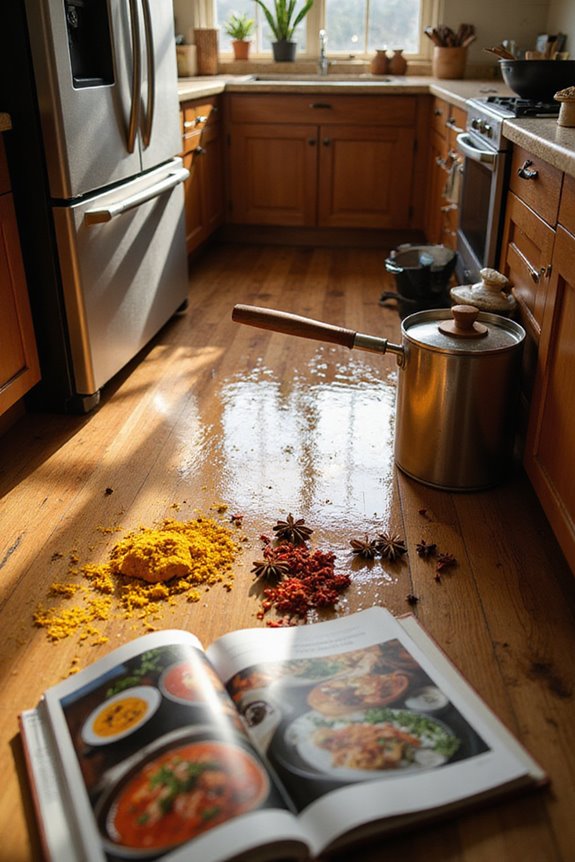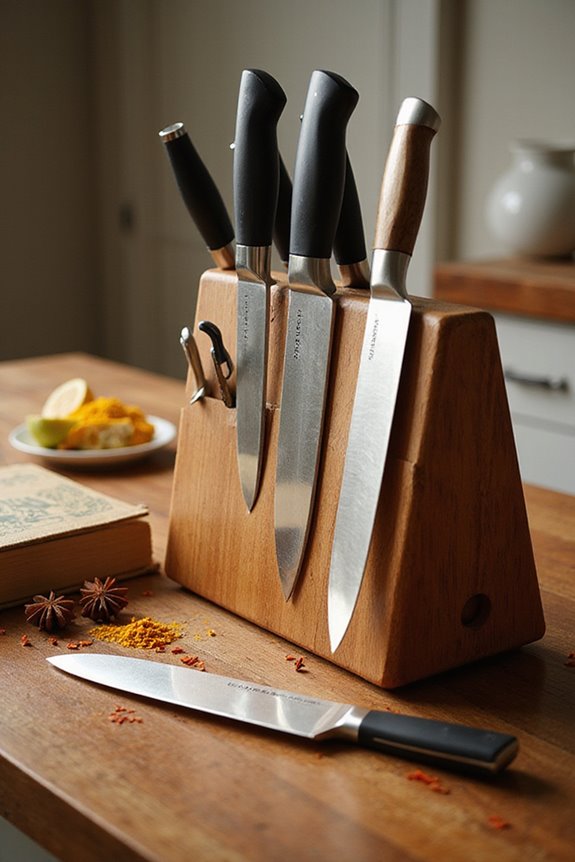If our appliance is leaking, let’s act quickly to tackle the issue! First, we’ll identify the source—check hoses, seals, and connections for cracks. Then, we should shut off the main water supply to stop any flow. Grab some towels to soak up the mess and open windows for airflow—it’s like giving our kitchen a delightful spring cleaning! So, let’s keep our eyes peeled for signs of leaks, and soon we’ll uncover more helpful tips and tricks!
Key Takeaways
- Shut off the main water valve or localized shut-off to stop the flow immediately.
- Cut off power and gas to prevent electrical or combustion hazards.
- Soak up the water with towels and protect valuables with waterproof barriers.
- Check for visible leaks around appliances such as hoses, seals, and connections.
- Consider installing leak detection sensors or automatic shutoff valves for future protection.
Identify the Source of the Leak
When we find ourselves facing a leak in our appliance, it can feel a bit like discovering a surprise flood at our holiday feast! Let’s explore some effective leak detection troubleshooting techniques to identify the source.
- Fridge: Check the water supply line and drain pan for cracks and overflows.
- Washing Machine: Inspect the hoses for bulging or cracks; they need TLC every five years.
- Water Heater: Look for signs of rust or corrosion around the tank and pipes.
- Dishwasher: Examine the door gasket and water inlet valve for wear. Additionally, make sure to routinely check the maintenance tips for cooking equipment to prevent any potential leaks caused by improper handling.
Immediate Steps to Take
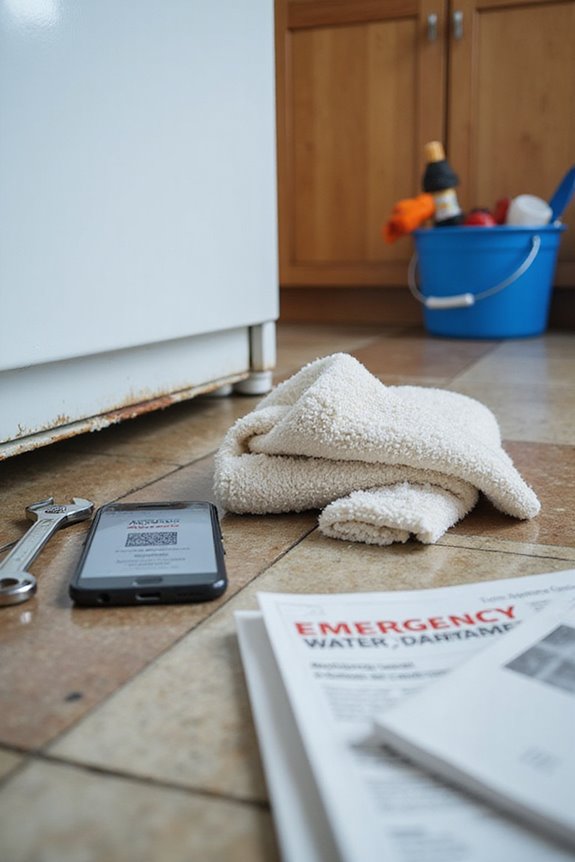
Appliances can sometimes throw unexpected surprises our way—kind of like the turkey deciding to dance off the table at Thanksgiving! When faced with a leak, we should react quickly to mitigate water damage. Here’s our game plan:
- Shut Off Water Supply: Turn off the main valve or a localized shut-off to stop the flow.
- Cut Off Power and Gas: Prevent shock hazards. If it’s a gas appliance, shut off the gas too!
- Contain and Remove Water: Use towels to soak up the mess and protect valuables with waterproof barriers.
- Prevent Secondary Damage: Open windows and use dehumidifiers to keep the area dry. Additionally, ensure that any steamer baskets or other kitchen tools that may have been affected are cleaned and maintained to prevent further issues.
Let’s manage this leak with savvy emergency procedures and avoid any culinary disasters!
Common Appliances That Leak Water
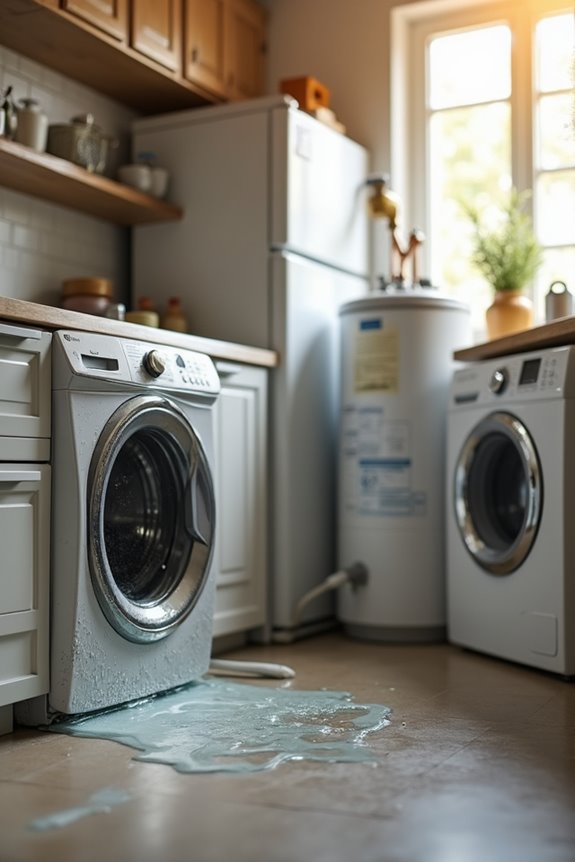
Leaks can be a real party crasher in our kitchen and laundry room, sneaking up on us just like an unexpected guest at a holiday dinner! Let’s explore the common culprits that might dampen our day:
- Washing machine leaks often stem from worn hoses and seals. A small crack can release a flood!
- Dishwasher leaks may come from faulty seals or drain hoses. Keeping it clean can help avoid spills.
- Water heater leaks can indicate age issues. A puddle means it’s time to check!
- Refrigerator leaks usually arise from cracked supply lines. Regular checks are key!
- Sink and toilet leaks can be sneaky but easy fixes, often from worn washers.
Staying proactive keeps our homes delightful and leak-free! Consider also checking the effectiveness of airtight seals in your storage containers to prevent moisture and potential leaks from other sources.
Signs of Potential Leaks
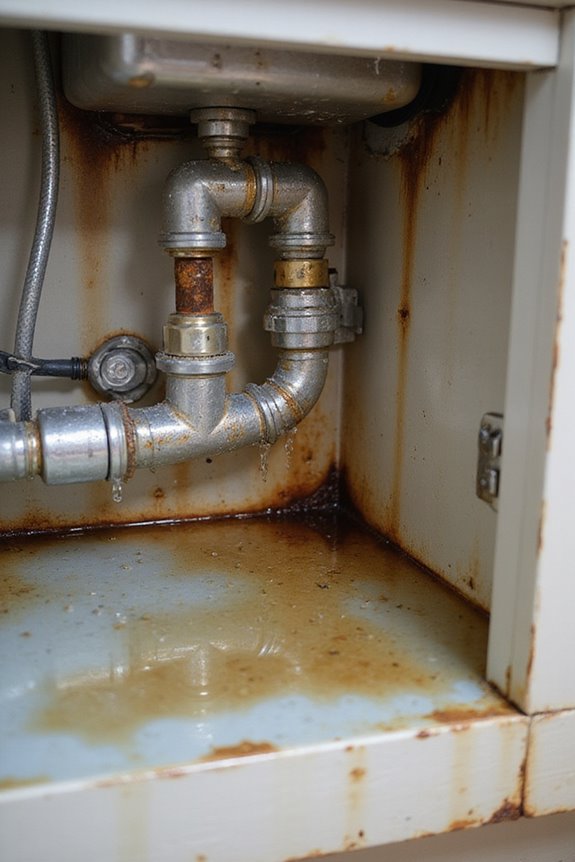
Keeping an eye out for signs of potential leaks helps us maintain our delightful kitchens and laundry areas, ensuring no surprises burst in like a poorly timed holiday guest! Here are some visual indicators to watch for:
- Puddles forming near appliances or discoloration on floors? That could mean trouble.
- Look for rust on connections or mold spots near appliances—these are strong auditory clues for hidden leaks!
We should also pay attention to smells. A persistent musty odor? That’s a signal to investigate! And if we hear any unusual hissing or dripping sounds, it’s time to check our appliances thoroughly. By staying aware and acting quickly, we can keep our spaces cozy and leak-free! Remember, using eco-friendly cleaning options can also help maintain a healthy environment while addressing potential leaks effectively.
Preventative Maintenance Tips
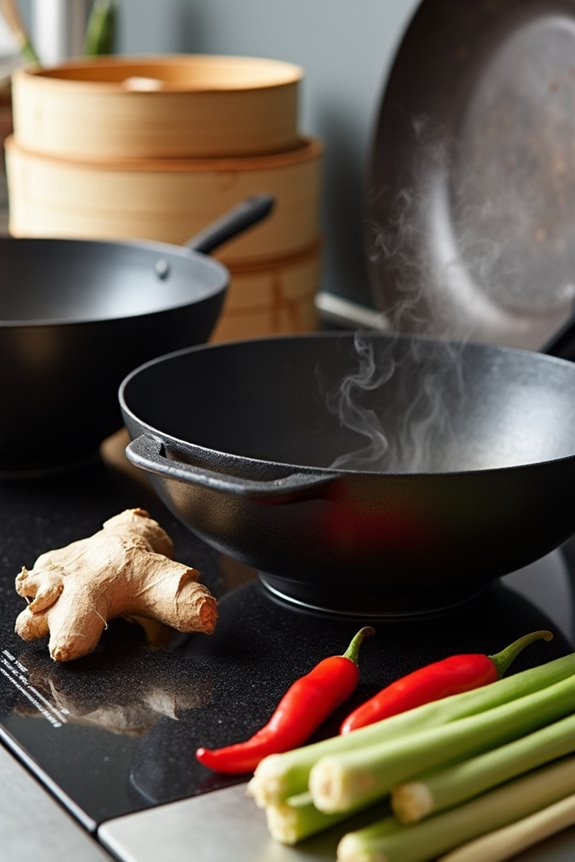
When we take a little time to nurture our beloved appliances, we can prevent those pesky leaks and create a more delightful home! Here are some fantastic preventative maintenance tips we can all embrace:
- Routine Inspections: Let’s check hoses for cracks or brittleness every 6-12 months. If they look sad, it’s time to replace them with strong stainless steel options!
- Cleaning: Regularly clean our refrigerator drip pans and dishwasher filters to avoid overflow. Think of it as tidying up for a holiday feast!
- Smart Positioning: Keeping appliances slightly away from walls can save us from potential water damage.
- Load Management: Let’s not overload our machines—no one wants a detergent tsunami! Additionally, maintaining appliances can lead to improved comfort and efficiency, much like how opting for high-quality bamboo products enhances our everyday experiences.
Tools and Products for Leak Management
To tackle pesky appliance leaks like pros, we’ve got some fantastic tools and products at our fingertips! Here’s what we need for effective leak management:
- Leak Detection Sensors: These delightful devices can catch water and other liquids before they wreak havoc. Spot sensors pinpoint leaks within inches—a real lifesaver!
- Automatic Shutoff Valves: Imagine a superhero stepping in right when trouble starts! These valves kick in immediately after leak detection to save our day (and floors).
- Monitoring Systems: Get real-time alerts on your phone, like a cheerful text from a friend reminding you to check on that roast! Additionally, it’s wise to use eco-friendly materials for any replacements or upgrades to promote sustainability.
When to Contact a Professional
What’s the best way to know when it’s time to call in the professionals for appliance leaks? If those pesky leaks persist despite our best DIY efforts, it’s time to seek professional expertise! Here are some delightful clues:
- Persistent leaks: If water continues pooling around our washing machine or refrigerator, we need to act fast.
- Complex issues: Strange noises, error codes, or appliances that refuse to kick on? That’s usually a sign of deeper problems!
- Electrical or gas risks: Any hint of shock or gas odors? Call a pro immediately.
We all want to keep our kitchens magical! Remember, professional leak detection can save us from future headaches and guarantee our beloved appliances last longer. Let’s keep our homes safe and running smoothly!
Potential Damage From Leaks
Even the most magical kitchens can experience a pesky leak from time to time! Those sneaky drips aren’t just annoyances; they can lead to some serious damage. We need to think about potential issues like:
- Structural Damage: Water can cause wood to rot and walls to weaken—yikes!
- Mold Growth: Just 24-48 hours under the right conditions, and mold starts partying. No one wants that guest!
- Electrical Hazards: Leaks near wiring can lead to short circuits or worse!
That’s why leak detection is essential for moisture control. Remember, it’s better to tackle leaks swiftly than to face costly repairs later. Let’s keep our kitchens delightful and safe!
Tips for Preventing Future Leaks
When we think about our delightful kitchens, let’s not forget that keeping them leak-free is crucial for culinary magic! To prevent unwanted surprises, we can implement some proactive preventive measures.
- Regular Inspections: Frequent checks of hoses and seals help us catch issues early.
- Timely Replacements: Upgrading rubber hoses to stainless steel every few years guarantees durability.
- Technological Aids: Installing leak alarms offers peace of mind and prompt alerts.
- Proper Use: Overloading appliances is a recipe for disaster; let’s treat them right!
Frequently Asked Questions
Can Appliance Leaks Cause Damage to My Home’s Foundation?
Absolutely, we’ve seen how appliance leaks can compromise our home’s foundation. Water damage often leads to costly repairs. By addressing leaks promptly, we safeguard not only our foundation but also our home’s overall integrity and value.
How Do I Know if the Leak Is Serious?
When evaluating if a leak’s serious, we should prioritize leak detection and regular appliance maintenance. Observing pooling water, rust, or unusual noises can help us identify potential issues before they escalate into bigger problems together.
Will My Insurance Cover Appliance Leak Damage?
Steering through leak coverage feels like sailing through stormy seas. Most insurance policies typically cover appliance leak damage, but it’s essential to review your plan’s specifics to guarantee we’re protected from unexpected squalls.
Can I Continue Using My Appliance if It’s Leaking?
We shouldn’t continue using a leaking appliance without taking safety precautions. Let’s prioritize leak detection and promptly turn off the appliance. Ignoring leaks can lead to serious hazards, and we all deserve a safe environment.
What Should I Do if My Appliance Is Still Under Warranty?
Have you ever felt anxious about appliance issues? If we’re under warranty, we should explore our warranty coverage for appliance repair. Let’s document everything and reach out to the provider to guarantee we’re fully supported.

